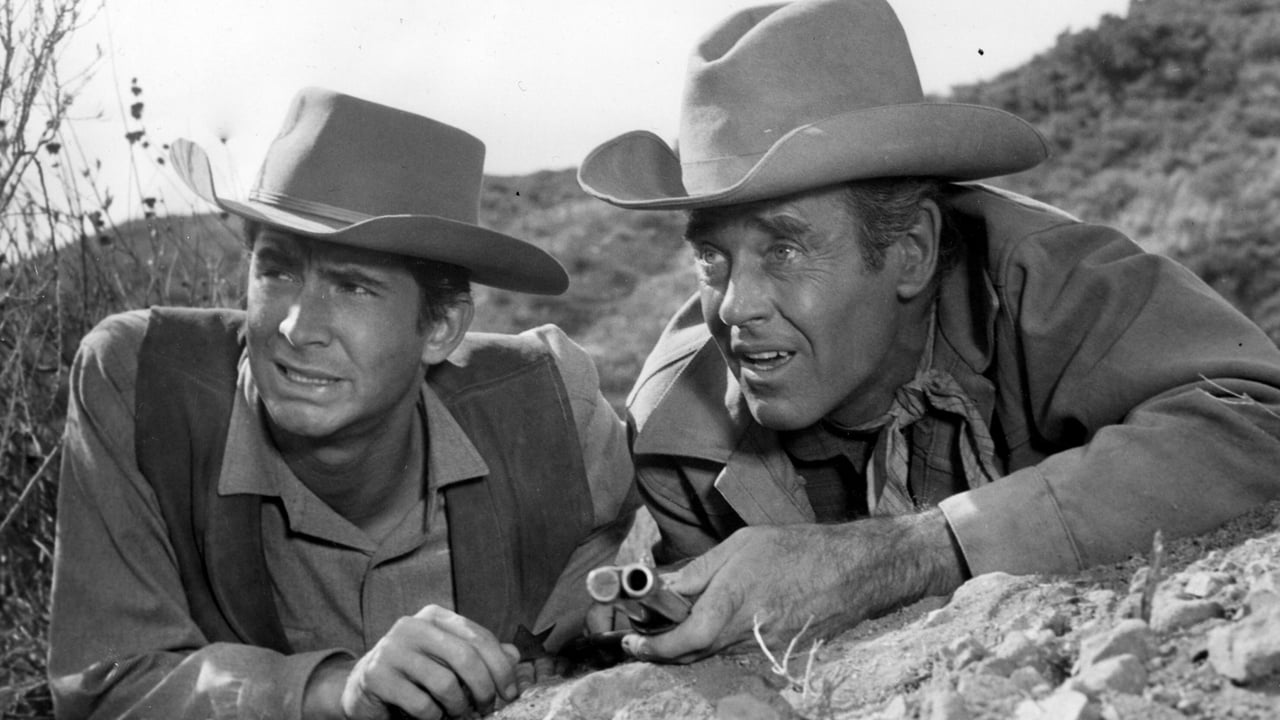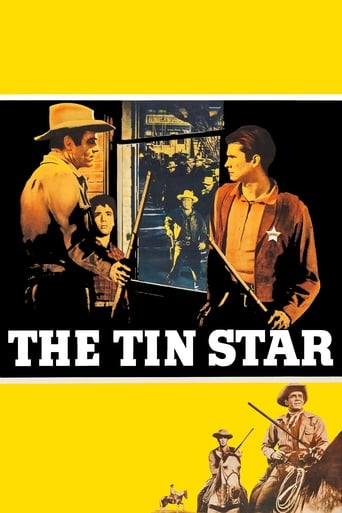

Westerns of the 50's are the best and to be missed if not for the fact we can see them again via rentals, DVD's and TCM entertainment. They had the quality movie stars, great plot points, good subject matter, were educational and tugged at all our emotions. Throw in horses, good and bad guys, love interest, dust, posse's and some shootings and we are off! Fonda comes through as a veteran of the time who survived using his abilities, guts, savvy and experience but gets dealt a life blow which he doesn't recover from until this movie. Its a believable story and will pull you in. Then there is the new sheriff who wants to do good and right but doesn't know what that is. That be Perkins. Put him together with Fonda and the story takes hold. The Wild West was unexplored times and territories and there are no end to the stories that came out of it. This be one of them. Good solid entertainment from start to finish with one of the best endings around. Feel good is so thick you can cut it with a knife. That's good directing. Enjoy a nice meal while watching along with a tasty drink too. Saddle up
... View MoreThis largely unique western deals with coming of age as a young sheriff, the somewhat controversial topic of vigilante justice, and hatred toward Native Americans by many whites on the frontier. We have 3 men or pair of men who are regarded by many in a small western town as murderers. Firstly, there's bounty hunter Morgan Hickman(Henry Fonda),who brings the body of a supposed fugitive into town, expecting a reward. We aren't told the crime committed by the fugitive, but presumably it didn't involve murder of a respected citizen. Most of the town people seemed to consider this murder a crime equal to or exceeding that of the crime committed by the fugitive, even though it was legal. Hence, he was shunned by most of the town people. However, he found an accepting soul in the form of a beautiful and charming widow and her rambunctious half-breed son(Betsy Palmer, as Nona, and Michael Ray as Kip). They tentatively accept Hickman as a roomer, but when he seems upset by Nona's revelation that her murdered husband was a Native American, she's about ready to throw him out. However, he apologizes and calms down her ruffled feathers sufficiently to stay, and eventually form a romantic relationship with her. Like Hickman, Nona and Kim are treated by most regionals as outcasts, she because she consorted with a Native American, and he because he's a half-breed. The second character considered a murderer by some is Bart Bogardus, a bully who runs the livery stable. He shoots down a Native American in the street, claiming self defense, with minimal supporting evidence. Many of the townies are not upset by this murder, as Native Americans were widely regarded as subhuman vermin, to be exterminated. Sheriff Ben, considering him a trigger-happy bully, asks for his gun. But Bogardus resists, pulls his gun on Ben, and Hickman shoots the gun out of his hand. Apparently, Bogardus is not prosecuted for this apparent murder. He heads up a posse going to look for the murderers of Doc McCord. Frustrated that they don't find them at their home, the posse burns their house and other buildings. Miffed that the team of Ben and Hickman capture them alive, Bogardus heads a vigilante group intent on lynching them right away. Ben stands in the way of this mob. Ben talks Bogardus down, but Bordardus tries to shoot Ben on the sly. Ben is a faster draw. The third murderers in the screenplay are the McGaffey brothers, who are charged with the murder of Doc McCord(John McIntire), who treated a bullet wound of one of them, acquired when they held up the stage, killing the driver. After these murders, they decided to hide in a cave in a canyon behind their house. Ben and Hickman serendipitously discover them there. Although Hickman, as an ex-sheriff, has advised Ben to shoot to kill, Ben wants to take them alive, if possible. Hackman helps him toward the goal. But, as mentioned, many townies want to see them hanged as soon as possible, without a trial.. Henry Fonda had witnessed a lynching when young, and found it revolting. Hence, he was keen to do a couple of films talking up the dangers of lynchings. He had been involved in a lynching in the previous movie "The Oxbow Incident", back in 1943. The earlier film "The Silver Whip" has a very similar plot to the present film, involving a thwarted lynching and a young man faced with the challenge of becoming a stage driver, as well as a sheriff's deputy. I regard that film, as well as the present film, as being more interesting and significant than "High Noon" or "The Searchers". The present film is quite possibly Anthony Mann's most significant western.I thought Fonda and McIntire did great jobs in their respective roles. Anthony Perkins' character comes across as too immature to be even a believable temporary sheriff, until toward the end, when Fonda's instructions paid off.Here is a good place to discuss some philosophy relating to vigilantism. From a moral(not necessarily legal) viewpoint, is vigilantism ever justified? If the judicial system is quite corrupt or otherwise ineffective, and you are very positive you have identified the guilty and they have perpetrated a crime of sufficient magnitude, vigilantism may be justified.Distinguishing between self-defense, vigilantism, duels and murder can be difficult. If a person is licensed as a bounty hunter, he is not a vigilante, technically, as long as his job description allows him to kill the fugitive. In the formal duels of the early 19th century, for example, usually one challenged another for a perceived deed or slight. They can be considered a duel between a vigilante(challenger) and one acting in self-defense(the challenged). If there is a mutual agreement to settle a dispute by a formal duel, both may be considered vigilantes.
... View MoreAmerican's tend to look towards the Clint Eastwood westerns for "gritty realism," in their westerns, yet here is a film that is more realistic than any of Clint's with the exception of Unforgiven.In his role as a former law-man turned bounty hunter, Henry Fonda shines as the voice of life experience trying to imprint itself on the soul of naive, young Anthony Perkins. Fonda gives Perkins advice that police are still given today by law enforcement training. Exchanges like this one are still true today: Morg Hickman/Fonda: A decent man doesn't want to kill, but if you're gonna shoot, you shoot to kill.Sheriff Ben Owens/Perkins: How about hittin' them in the arm? Morg Hickman: That hokey-pokey'll get you killed fast. There're a lot of guys bragging about shooting a gun out of somebody's hand. They're lying. They shot to kill. A wounded man can still kill you.This is a movie about standing your ground when the majority are against you and learning hard lessons through bitter experience even when the voice of experience is trying to help you avoid having to learn it the hard way.If you're in the mood for an older western that is truer to life than you might think, this is a movie for you.
... View MoreIt doesn't matter what the genre is, when the writing is great, then the film will usually be great also. This Oscar-nominated film had a superb script that made everything else look fantastic.Henry Fonda is an ex-sheriff turned bounty hunter that appears in town to collect his reward. He has to wait until it comes, so he ends up befriending the town outcast - Betsy Palmer (before she became Jason's mom), a woman with a half-breed child, and helping the new Sheriff - Anthony Perkins, before he went Psycho and killed his mom.Fonda gave a measured and stirring performance in a role that was supposed to go to Jimmy Stewart. In the process of helping others, he was able to find himself and turn his life around.In a humorous scene old Doc McCord (John McIntire) had just delivered the 12th child to a farmer that lived in the sticks. It was 2:30 am and he leaned back to sleep in his carriage and told his horse to head home saying, "You probably know the way better than I do." Now, that is the kind of cruise control we don't have on our modern vehicles! A great film that shows how important writers are to the movies.
... View More